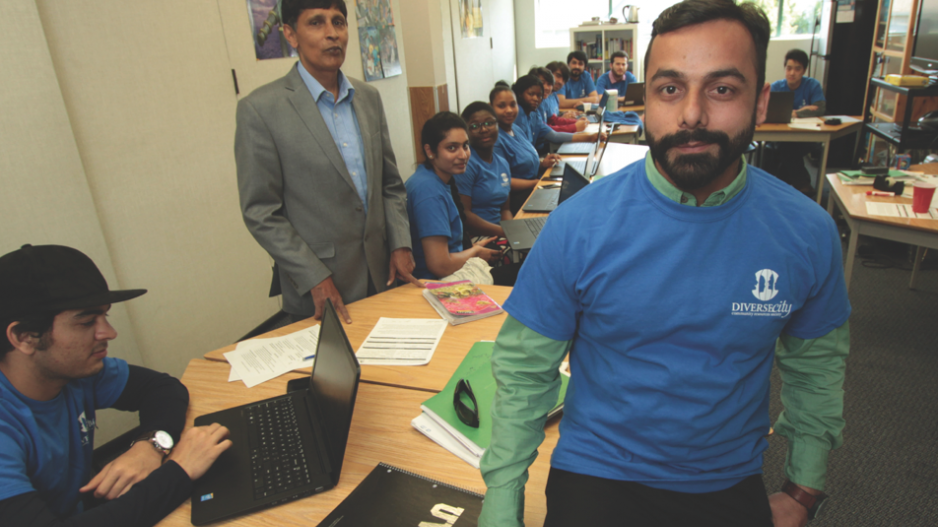Although he was born and raised in Chandigarh, a city in the northern Punjab state of India, 29-year-old Talwinder Singh Rai sharpened his English skills listening to a Canadian. Working for U.S. oil and gas company Oceaneering International Services Ltd. as a mechanical engineer in his homeland, he had frequent contact with his Canadian manager, who was living and working in the U.S.
“Every day we spoke to him over the phone,” said Singh Rai, who has been in Canada for just over a month. “So I really got a chance to practise and improve my English in that regard.”
Read: Recent immigrants face uphill battle for good job
While Singh Rai has a bachelor of technology degree from I.K. Gujral Punjab Technical University and job experience in the field of supply chain management, the Surrey resident is hoping for an entry-level job in customer service.
Singh Rai is enrolled in one of Diversecity’s two youth programs. The Surrey-based non-profit agency runs various classes and outreach services to help recent immigrants find work in Canada and acclimatize to their new country. Singh Rai said his coming to Canada was spurred by word of mouth back home in India.
“I had heard of a few of my friends that had applied,” he said. “And so in order for me to find better opportunities for me and my wife and future children, I decided to move to Canada for a new venture.”
Singh Rai said the first adjustment was getting used to cars driving on the opposite side of the road (in India they follow British road rules). India is also known for a large, loosely regulated society and a huge off-the-books economy. Many low-income workers across India neither pay taxes nor have basic financial services such as bank accounts. This has also meant that Canada has taken some getting used to.
“All the rules and regulations,” said Singh Rai, when asked about anything that overwhelmed him upon arrival. “The Canadian system is amazing. I’m loving it here, but there are a couple things that are far different. There is a system for everything here, which is a lot different than back home.”
However, finding work as a mechanical engineer has been tough, as employers are hesitant to acknowledge Singh Rai’s credentials. Thus he’s hoping to find entry-level work and start saving for the accreditation process, which he still knows little about as a new immigrant.
Johnson Varghese, who runs the Diversecity youth program Singh Rai is enrolled in, said the idea is to get Singh Rai basic Canadian skills training under his belt. The 16-week program offers training in food safety, workplace hazardous materials information, occupational first aid and cashier and customer training.
Varghese said the benefits of the basic training are twofold.
“I’ve seen kids who didn’t speak English very well, and after two months of working they’ve totally changed,” he said. “They know the lingo that is used on the street and how to do customer service properly. So the biggest challenge is getting that job to pay for fees, because a lot of times their parents are struggling, too, to make ends meet, and any money they can contribute helps as well.”
The program has youth aged 16 to 30 enrolled from a wide range of countries including Iraq, Pakistan, Congo and the Philippines. Susan Liu Woronko, manager of employment services for Diversecity, noted the story of Eh Hsar, a 24-year-old government-assisted refugee who came from Thailand in 2003. Hsar, who knew little English at the time of her arrival, learned a lot of her language skills while working at Tim Hortons, and is now on the path towards becoming an early childhood educator.
Varghese said the goal is not only to help recent immigrants and refugees learn English, but also to help them learn about Canadian society.
“We have a module in the program in which we talk about Canada, Canadian etiquette, Canadian culture, Canadian hockey teams,” he said. “I always tell them, ‘In India everybody talks about cricket, but if you come to Canada there’s nobody you can talk to about cricket unless you find an Englishman or an Australian.’ … I tell them fluency can be a liability if you have nothing to talk about.”
Outlined in the LIP research study were a number of key challenges recent immigrants struggle with. The second-highest ranked issue on the list was adapting to “Canadian workplace culture.”
The report also noted that “recent immigrants to Surrey experience far lower average employment income than their peers in Vancouver and Burnaby – likely because of Surrey’s lack of industries that employ knowledge workers – the kinds of immigrants that score well in Citizenship and Immigration Canada’s points system.” •




